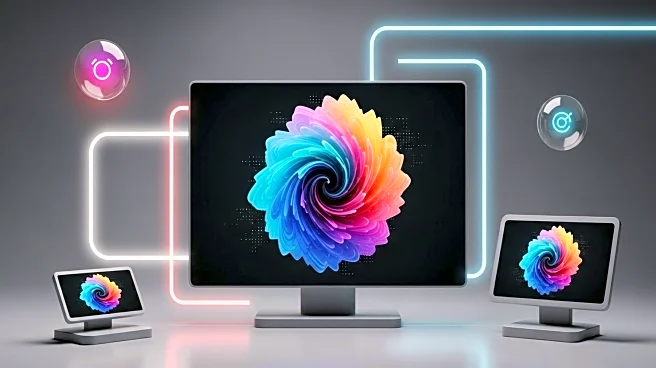What is the story about?
What's Happening?
OpenAI has launched a new app called Sora, which utilizes its upgraded Sora 2 media generation AI model to create high-definition videos from simple text prompts. The app quickly became popular, topping the iOS App Store's Photo and Video category. Sora allows users to create lifelike videos featuring themselves, friends, or other characters, including those under copyright. This has raised concerns among copyright and deepfake experts, as users can feature copyrighted characters like Mario and Lara Croft in their creations. OpenAI has not specified the data sources for its models, but the presence of copyrighted characters suggests the use of protected information. The app includes moving watermarks and invisible metadata to indicate AI-generated content, though these can be easily removed.
Why It's Important?
The release of Sora highlights ongoing debates about copyright in the realm of AI-generated content. OpenAI's approach, which allows copyrighted material to be featured unless copyright holders opt out, challenges traditional copyright norms. This could have significant implications for content creators, media companies, and legal frameworks surrounding intellectual property. The app's ability to create realistic videos raises concerns about deepfakes and the potential misuse of AI technology. As AI models continue to evolve, the balance between innovation and legal compliance becomes increasingly critical, impacting industries reliant on intellectual property protection.
What's Next?
OpenAI faces potential legal challenges as copyright holders may seek to protect their intellectual property from unauthorized use in AI-generated content. The company has already been involved in lawsuits over copyright infringement claims. As Sora's popularity grows, OpenAI may need to refine its policies and technologies to address these concerns. The app's invitation-only access suggests a cautious rollout, allowing OpenAI to monitor usage and address issues before expanding availability. Stakeholders, including media companies and legal experts, will likely continue to scrutinize the app's impact on copyright law and AI ethics.
Beyond the Headlines
The development of Sora underscores the ethical and legal complexities of AI-generated media. The app's ability to create realistic depictions of individuals and characters raises questions about privacy, consent, and the potential for misinformation. As AI technology advances, society must grapple with the implications of increasingly blurred lines between reality and computer-generated content. The need for robust authentication measures and transparent provenance systems becomes crucial to maintaining trust and accountability in digital media.















